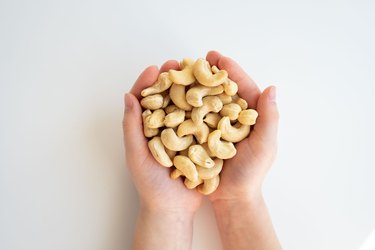
It's true that cashews have a pretty high fat content. A single serving (about 18 nuts) contains nearly 20 percent of your recommended daily fat intake, according to the U.S. Department of Agriculture (USDA). But when it comes to avoiding cholesterol, make no mistake: Cashews are the good guys.
The Fatty Goodness in Cashews
Video of the Day
Not all fats are created equal, and the bulk of the fat found in cashews falls into the good-for-you fat category. Accordingly, cashews can actually lower, not raise, low-density lipoprotein (LDL) cholesterol, known as the bad type.
Video of the Day
"Cashews contain very good sources of polyunsaturated fats and monounsaturated fatty acids," says Qi Sun, MD, an associate professor of nutrition at Harvard T.H. Chan School of Public Health. "We have very good data showing that nut consumption significantly reduces your risk of developing coronary heart disease."
Indeed, a March 2017 study published in the American Journal of Clinical Nutrition found that people who ate one to two servings of cashews a day for a month had 5 percent lower bad cholesterol levels than people who ate potato chips.
Read more: How Are Cashews Good for You?
Good vs. Bad Cholesterol
Bad fats — which the American Heart Association (AHA) describes as trans fats and saturated fats — can cause the liver to make excess LDL cholesterol. Good fats, on the other hand, including polyunsaturated fats and fatty acids, can raise your high-density lipoprotein (HDL), known as the good cholesterol.
Though LDL and HDL are both types of cholesterol, only LDL is guilty of setting up camp inside the walls of your arteries, gradually narrowing the space through which your blood can travel. Over time, this buildup, called atherosclerosis, raises your risk for heart attack and stroke, according to the AHA.
HDL doesn't settle in your arterial walls. Instead, the AHA notes, it travels back to your liver, where your body can flush it out along with some of the bad LDL that it brings with it, in effect lowering your body's bad cholesterol levels.
Cashews and Saturated Fats
Saturated fats, which Dr. Sun says are solid at room temperature, can raise your LDL levels. Common sources of saturated fats include animal products like meat and dairy and commercially prepared baked goods such as cookies and cakes, according to Harvard Health Publishing.
If you read the nutritional information from the USDA closely, you'll notice that cashews do contain some saturated fats. But because a much higher percent of the fat found in cashews falls into the good category, Dr. Sun says, the cholesterol effect is still net positive.
He says that the benefits of the polyunsaturated and monounsaturated fats in cashews outweigh the detriments from the small amount of saturated fats. "It's really hard to completely limit saturated fat intake," Dr. Sun says, explaining that it's important to look at the whole picture when it comes to a food's fat composition.
Heart-Healthy, But Don’t Go Nuts
Even though the good fats found in cashews can lower your bad cholesterol, it's important to bear in mind the overall calorie content before eating a whole bag of them.
According to the AHA, when your body takes in more calories than it needs, it converts the excess energy to triglycerides, meaning stored fat to be used later. So, if you consume well beyond the recommended serving of cashews, you pose the risk of counteracting all the cholesterol-lowering benefits with excess triglycerides. To get the most benefit out of cashews, pay attention to the serving size, which the USDA lists as one ounce (about 18 nuts).
Cashews also tend to be sold in all sorts of tasty, yet unhealthy varieties. Salted cashews and cashews roasted in oils can also counteract the benefits. According to the Mayo Clinic, it's smart to reach for raw or dry-roasted cashews whenever you can. And, they're actually pretty flavorful on their own.
- Qi Sun, MD, associate professor of nutrition, Harvard T.H. Chan School of Public Health, Boston
- American Journal of Clinical Nutrition: "Cashew Consumption Reduces Total and LDL Cholesterol: a Randomized, C, Controlled-Feeding Trial"
- American Heart Association: "The Skinny on Fats"
- AHA: "HDL (Good), LDL (Bad) Cholesterol an Trigylcerides"
- Harvard Health Publishing: "The Truth About Fats: the Good, the Bad, and the In-Between"
- Mayo Clinic: "Nuts and Your Heart: Eating Nuts for Heart Health"
Was this article helpful?
150 Characters Max
0/150
Thank you for sharing!
Thank you for your feedback!